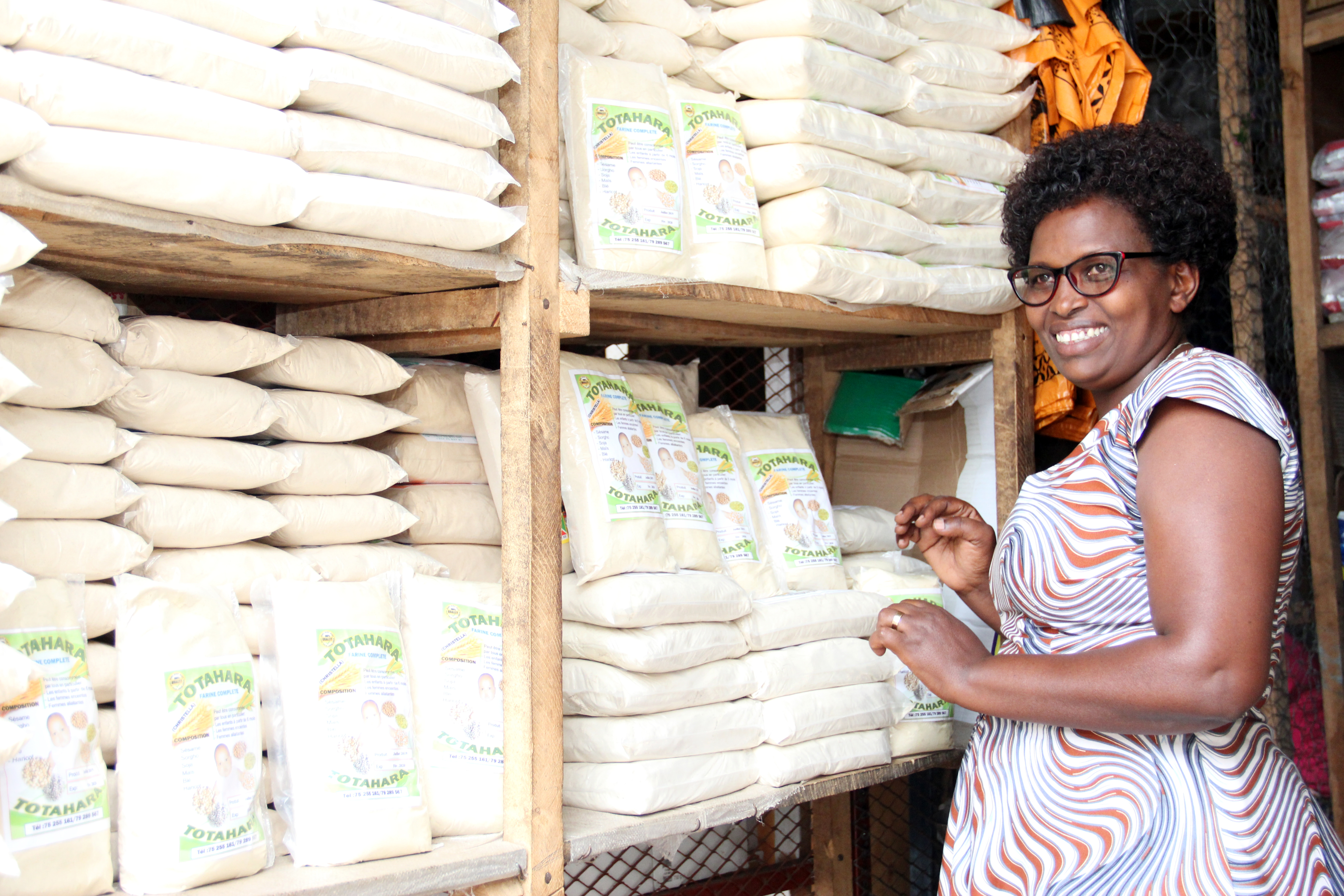For reduced market barriers, diversified enterprise and livelihood opportunities, and increased availability of diverse nutrient-rich foods
How are bean flours empowering women in the African region?
When the country plunged into a crisis as a result of the political unrest that rocked Burundi, food shortages and population displacement was widespread. During such times, out of sheer need for good quality, nutritious porridge flour for her baby’s weaning, Christella Ndayishimye started mixing her own bean-based composite flour. This sowed the seeds for Totahara in her mind and Christella started as a small enterprise 2009. Equipped with her own recipe of bean-based composite flour after a Pan Africa Bean Research Alliance (PABRA) facilitated training and nine employees, Christella started Totahara as a small enterprise from her backyard producing up to 1 ton of flour per month.
The Pan-Africa Bean Research Alliance (PABRA) facilitated by the Alliance of Bioversity International and International Center for Tropical Agriculture (CIAT) collaborated with the Institut des Sciences Agronomiques du Burundi (ISABU) in 2015 and engaged Christella Ndayishimye to scale up production of composite bean flour for weaning infants and lactating mothers. This has since helped Christella upgrade the flour processing facilities, link to markets and technical capacity that saw her production increase exponentially.
What challenges does this innovation address?
Such enterprises implemented by Bean Business Platforms are vehicles designed to implement program interventions by bringing together critical actors to improve business ecosystems and incentivize actors in bean corridors.
This approach is operationalized through innovation platforms that aim to eliminate bottlenecks in the bean value chain including reduction of market barriers, diversify enterprise opportunities, increase livelihood opportunities and availability of diverse nutrient-rich foods, and reduce pre- and post-harvest losses. This innovation contributes to SDG 2 “End hunger, achieve food security and improve nutrition and promote sustainable agriculture”, SDG 1 “To end poverty in all its forms, everywhere”, SDG 5 “Achieve gender equality and empower all women and girls” and SDG 8 “Promote sustained, inclusive and sustainable economic growth, full and productive employment and decent work for all”.
Results achieved through this innovation
Since being launched in 2009, Christella used her own funds supported by a little boost from funding agencies in 2015. With newly secured funding from these agencies, she has increased Totahara’s operational capacity to produce around 325 tons of flour per year for 105 outlet shops. Christella also mentors 5 other milling SME’s and is linked to over 1250 women farmers planting bio-fortified beans varieties.
Christella now distributes her products to 19 wholesale outlet shops and non-governmental organizations in Burundi, 10 outlet traders in DR Congo, and 2 traders in Rwanda. Since 2020, she also supplies bean-based flour to World Vision which runs 22 under-five pilot community schools programme which have seen a reduction in stunting levels from 58% to 52% within a year of using this flour (Women in Burundi supported to save time and improve children’s nutrition – (pabra-africa.org)
Partners and funders of this Innovation
Through the partnerships of Alliance of Bioversity International – International Center for Tropical Agriculture (CIAT) and Pan Africa Bean Research Alliance (PABRA), Totahara was able to gain momentum and grow exponentially. Other partner and funding agencies include Institut des Sciences Agronomiques du Burundi (ISABU) Swiss Agency for Development and Cooperation (SDC), Global Affairs Canada (GAC) and Grains Legumes and Dry Land Cereals (GLDC).
Next steps to scale this Innovation
As a Stage 4 and a Maturity level 3 innovation, these platforms have permitted farmers to access market easily with their better seeds and improved nutrient-rich bean varieties. This has increased the demand as consumers buy nutrient-rich foods that increase their well-being. The flow between supply, demand and quality of the products enhanced has helped improve the business environment with rising interest from policy makers to invest in this innovation to increase the income of actors along the value chain who contribute to nutrition and food security goals. Totahara has created market opportunities to more than 1,250 farmers. Christella is working with 25 employees at the factory, eight are women and 17 are youth operating the machines. PABRA has now scaled up this approach to support 14 other women entrepreneurs in Tanzania, Uganda, Madagascar, Rwanda, and Kenya. Christella also continues to mentor other small flour milling SME’s and hopes to teach other women entrepreneurs across and beyond the country.
Author(s): Ramya Kulkarni (CRP-GLDC MEL Team).
Collaborating Partner(s):
References:
- https://www.pabra-africa.org/empowering-women-entrepreneurs-to-feed-the-nation/;
- https://www.pabra-africa.org/building-partnerships-fight-nutrition/
- https://www.pabra-africa.org/women-entrepreneurs-empowered-through-beans-agatha-christella-tei-sheila/
- https://www.pabra-africa.org/super-flour-launched-in-uganda/;
https://www.pabra-africa.org/bean-based-products-changing-diets-in-africa/
This blog first appeared on the CGIAR Research Program on Grain Legumes and Dryland Cereals (GLDC)

